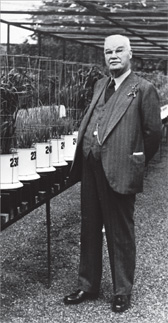In my talk, I would like to consider, from a biological point of view, whether this symbiosis can, and indeed should, continue. I wish to address three questions: "What is theoretically possible?"; "What is practically feasible?"; and "What is socially desirable?".
I will start from the position that the aim of developed country agriculture is to produce the safe, high-quality food that people want, at a price that they are prepared to pay, using techniques that they accept as being sustainable. I will then consider these three questions from two standpoints: commodity production at global prices; and niche market production where added value resides further up the food chain. I will argue that the technology interactions will differ markedly in these two approaches, and that much research is predicated upon the assumption that the first standpoint is the only viable one. I will question that assumption and consider how biological research can impact upon high-value production systems.
It could be argued, with some force, that the development of "Western" agriculture has represented an effective symbiosis between biology, chemistry and engineering. Understanding the basis of crop and animal production systems has led to the targetting of engineering advances and novel chemicals that have, together, sustained the productivity increases of the 20th Century.
In my talk, I would like to consider, from a biological point of view, whether this symbiosis can, and indeed should, continue. I wish to address three questions: "What is theoretically possible?"; "What is practically feasible?"; and "What is socially desirable?".
I will start from the position that the aim of developed country agriculture is to produce the safe, high-quality food that people want, at a price that they are prepared to pay, using techniques that they accept as being sustainable. I will then consider these three questions from two standpoints: commodity production at global prices; and niche market production where added value resides further up the food chain. I will argue that the technology interactions will differ markedly in these two approaches, and that much research is predicated upon the assumption that the first standpoint is the only viable one. I will question that assumption and consider how biological research can impact upon high-value production systems.
Speaker Details
Professor Pollock was appointed Research Director of IGER in 1993. He joined the staff of the Institute in 1974, when it was the Welsh Plant Breeding Station and became a member of the senior management team in 1989 as Head of the Environmental Biology Department. He is an Honorary Professor of the University of Wales Aberystwyth (Institute of Biological Sciences) and of the University of Nottingham (School of Agriculture) and has teaching duties at both sites.
Chris graduated from Cambridge in 1968, having studied botany. In 1972, he obtained a PhD from Birmingham University in Microbiology and MA from Cambridge, and subsequently was awarded a DSc from Birmingham in 1993. He was a Fulbright Fellow at The University of California, Davis from 1979-1980 and a NATO Senior Visiting Research Fellow at Purdue University, Indiana from 1987 to 1992.
His personal research is in the area of plant responses to environmental stress, covering the basic mechanisms of growth, photosynthesis and the storage of reserve carbohydrates in grasses, cereals and legumes. He still leads a research project in this area. He has published over a hundred papers and reviews on aspects of basic plant science, and also has interests in the responses of agricultural crops to climate change. He was a member of the Climate Change Impacts Review Group which produced a report in 1996 for the Department of the Environment. He has chaired the Plants and Microbial Sciences Committee of BBSRC. He is currently:
Chair of the Scientific Steering Committee for Field-Scale Evaluation of Herbicide-Resistant Crops
- Member of ACRE (Advisory Committee on Releases to the Environment)
- Member of the Technology Foresight Panel on the Food Chain and Crops for Industry
- Member of the National Assembly's Farming for Futures Group
- Member of the Wales Waste Forum Composting Sub-Group
- Member of the Stapledon Trust
He is a Fellow of the Royal Agricultural Societies and of the Institute of Biology.


 The annual T.B. Macaulay Lecture is held to honour the vision of
The annual T.B. Macaulay Lecture is held to honour the vision of 